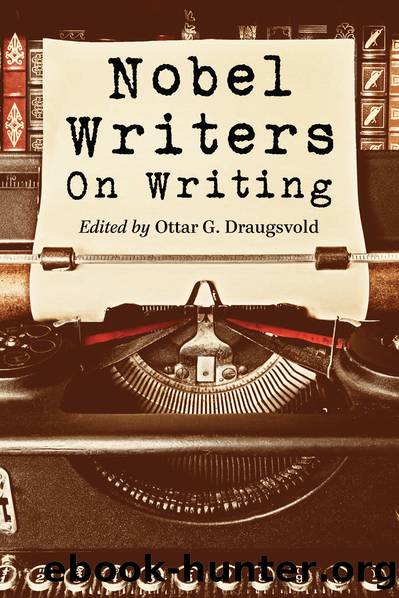Nobel Writers on Writing by Ottar G. Draugsvold

Author:Ottar G. Draugsvold
Language: eng
Format: epub
Publisher: McFarland & Company, Inc., Publishers
Published: 2020-07-17T00:00:00+00:00
21.âGabriel GarcÃa Márquez
You donât know how much a dead man can weigh.
âGabriel GarcÃa Márquez1
From misunderstanding grows solitude. âTo the Europeans, South America is a man with a mustache, a guitar, and a gun. They donât understand the problem,â the doctor says in No One Writes to the Colonel. The vast geography of South America appears dreamlike or nightmarish from a European perspective. The Amazon River, containing 20 percent of the worldâs fresh water, measures a hundred miles across at the mouth. Rain forests are larger than European countries. The land is shaken by frequent violent earthquakes, devastated by hurricanes and deluged by unending rain for months. This is the reality of South America. To the European it is an exaggerated reality.
Interwoven with outsized geography is a variegated history of brutality, impotence, temporary triumph and frustrated expectations. Gabriel GarcÃa Márquez (1928â ) absorbs all these contradictions and reforms them with pulsating boundless humanity in his writing. While many ânew novelistsâ consciously attempt to narrow and desiccate the human consciousness, Gabo, as he is affectionately known in South America, paints a panorama of the organic human experience in this immense reality. His tableau realistically portrays the interwoven fabric of climate, geography, history, and politics as felt in South America. If the fabric of daily life in Colombia seems magical to the European mind-set, it illustrates the continental differences. He describes himself as a ârealist writer.â2 For Gabo, realism includes both objective reality and the response of ordinary people to those realities while swimming âin a sea of common catastrophes.â3
Much of the âmagical realismâ attributed to his writing comes either from the folktales of the region or family stories he was told as a youth. To cite but one example, his grandfather, Colonel Nicolas Márquez, a veteran of the Thousand Daysâ War, reportedly sired a dozen illegitimate children while soldiering and spent his last years waiting for a government pension that never came. These facts were each reported in One Hundred Years of Solitude and No One Writes to the Colonel, respectively. South America is rich in the humanity of growth and decay, and GarcÃa Márquez reflects that organic richness in his writing.
Gabo himself argues, âThere is a tendency to underestimate literary culture, to believe in spontaneous invention. Actually literature is a science one has to learn and there are 10,000 years standing behind every short story that gets written. Ultimately you learn literature not in the university but from reading and rereading other writers.â4 He fully acknowledges his inheritance from dozens of great writers, among them: Faulkner, Hemingway, Woolf, Rabelais, France, and Kafka. âI understood that there existed in literature other possibilities besides the rational and academic ⦠and I found my true path as a writer,â5 he responded after his first reading of Kafkaâs Metamorphosis.
What sets Gabo apart from many of his contemporaries is his stunning skill at depicting the life of common people with the subtlety of Dickens, the humor and pathos of Cervantes, all the while enlisting those sleepy
Download
This site does not store any files on its server. We only index and link to content provided by other sites. Please contact the content providers to delete copyright contents if any and email us, we'll remove relevant links or contents immediately.
The Power of Myth by Joseph Campbell & Bill Moyers(1068)
A Social History of the Media by Peter Burke & Peter Burke(988)
Half Moon Bay by Jonathan Kellerman & Jesse Kellerman(987)
Inseparable by Emma Donoghue(983)
The Nets of Modernism: Henry James, Virginia Woolf, James Joyce, and Sigmund Freud by Maud Ellmann(913)
The Spike by Mark Humphries;(812)
The Complete Correspondence 1928-1940 by Theodor W. Adorno & Walter Benjamin(789)
A Theory of Narrative Drawing by Simon Grennan(783)
Culture by Terry Eagleton(776)
Ideology by Eagleton Terry;(743)
World Philology by(719)
Farnsworth's Classical English Rhetoric by Ward Farnsworth(715)
Game of Thrones and Philosophy by William Irwin(712)
Bodies from the Library 3 by Tony Medawar(709)
High Albania by M. Edith Durham(705)
Adam Smith by Jonathan Conlin(695)
A Reader’s Companion to J. D. Salinger’s The Catcher in the Rye by Peter Beidler(689)
Monkey King by Wu Cheng'en(654)
Comic Genius: Portraits of Funny People by(652)
